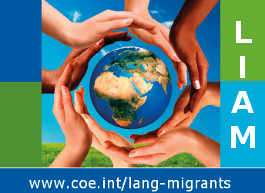Language of origin
The names given to language categories are always problematic. Even the use of the word language to describe a language variety is not self-evident, as some are identified with terms such as patois or dialect, implying that they do not enjoy the same legitimacy as “real” languages.
An external definition
In the case of migrants, reference is often made to the term language of origin, which is defined in the Guide for the Development of Language Education Policies in Europe as “language variety, often the first language, of persons or groups who have moved to live in other states. These speakers must adapt linguistically to the new environment and learn, at least partially, the language (or languages) of the host country”.
This is, however, an external description: for the speakers concerned, it is their mother tongue. They themselves can only refer to it as their language “of origin” if they no longer use it much or at all: that makes it the language variety of their parents and grandparents or those who stayed in their country of origin. It is the language “from back there”, which they wish:
- either to hide, as it is a tangible sign of difference and foreign languages are not readily accepted in the host society;
- or to use between people of the same origins, for practical reasons and also to demonstrate belonging. In these contexts, a language of origin may take on the role of a language of identity.
It cannot be characterised in isolation, but as a function of its place in a speaker’s individual repertoire.
The term is actually reserved for certain first languages which are not used or are not autochthonous in the host society. We probably would not instinctively say that English was the language of origin of an English-speaking civil servant stationed in Brussels. The term language “of origin” tends to be used for languages which are regarded as being very “exotic”, of low international prestige or used by poor migrants from poor regions.
Language of yesterday, language of tomorrow
For migrants, it is not the language of somewhere else but that “of before”, ie before their departure from their own country. It is a source of “linguistic nostalgia” for their children, for example, and for the adults themselves, who may tend to forget it for lack of practice, and it resurfaces in a delightful, lively manner when a particular word or expression is used.
The language of origin is therefore mostly the first language of migrants: the one in their repertoire which they use with their families, relatives and fellow nationals. The diffuse linguistic intolerance which may affect certain unpopular languages means that there may be a tendency not to pass it on. Language teaching in the language of the host society must take account of these languages, by making even only a symbolic place for them and by encouraging the learners to pass them on, because the relevant knowledge is an asset for their children’s future. And this contribution by migrants is a boon for the host society, which it would be economically harmful to let go to waste.
JCB



